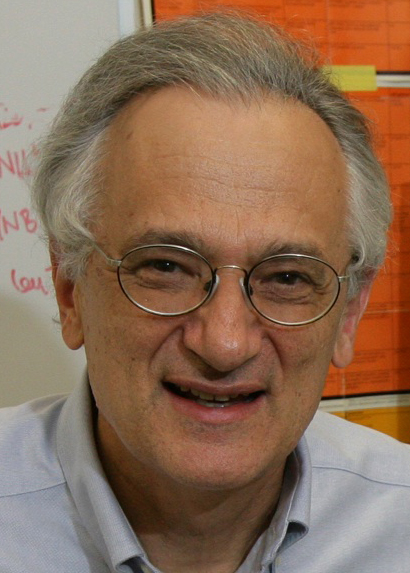Professor Steven Clarke honored for his research on aging

Steven Clarke
Professor of chemistry and biochemistry
By Andra Lim
Nov. 1, 2009 10:21 p.m.
Many teachers simply lecture.
Steven Clarke, professor of chemistry and biochemistry and director of the UCLA Molecular Biology Institute, tells stories.
“When I was growing up, my parents would take me camping,” Clarke said. “My teaching style derives from rangers sitting around the campfire and talking about things that matter. Teaching is about having an exciting narrative, and within that narrative giving some idea of how science works.”
Clarke was named the 107th Faculty Research Lecturer, the highest honor given by the Academic Senate. He will share the tale of his research on “Aging and Rejuvenation: Chemistry and Biology at Work” on Tuesday afternoon. The purpose of the lecture is to recognize outstanding professors, and acquaint the UCLA community with the speakers’ achievements and insights.
“Steven has done a lot of very outstanding things that have a wide general appeal,” said Kendall Houk, professor of chemistry and biochemistry and chair of last year’s Faculty Research Committee. “It’s not easy to be chosen ““ all the candidates are good. No bums get nominated for this.”
At UCLA, Clarke’s lab pioneered the field of studying protein repair and aging.
“Age is a conflict between basic chemistry and basic biology,” Clarke said. “We’re made of molecules that are not themselves stable. If you put water in a jar, and came back a million years later, it would still be there. If you put a molecule in a jar, and came back six months or even three days later, it would be broken down. We’re falling apart, but biology fights back.”
Just how strongly biology fights back is apparent from the body’s endurance.
“Humans can do very well,” Clarke said. “Paul Boyer, who was a (faculty research) lecturer in 1982, is going to be 92 this summer, and he’s hopping all around the room. People at 79 can run marathons.”
In addition to speaking about this molecular battle on Tuesday, Clarke will pose a tougher, unanswered question: How do we tilt the balance between chemistry and biology?
Each year, the Faculty Research Committee chooses one North Campus and one South Campus professor to lecture. The committee, composed of several former honorees, selects the speaker from nominations by department chairs or other professors. Among past lecturers are Professors Shepherd Franz, Charles Haines, Earle Hedrick and Arnold Schoenberg, who all have had campus buildings named after them.
“I’m in total delight to be honored by my colleagues,” Clarke said. “It’s a once-in-a-lifetime experience where the glow lasts a long time.”
Clarke’s Bruin ties go back to 1966 when he was an undergraduate at Pomona College and worked at the UCLA Brain Research Institute with Dr. James E. Skinner and Professor Don Lindsley, the 1960 Faculty Research Lecturer. Clarke joined the UCLA faculty in 1978 after obtaining his doctorate from Harvard University and doing postdoctoral work at UC Berkeley.
The inspiration for the research in Clarke’s UCLA lab stemmed from a number of sources. His interest in aging sparked when he heard a graduate student do an oral exam on the topic. The curriculum of a chemistry course he was teaching and the calculations a student performed based off a journal article ignited his experiments.
“All the information I had came together, and we had a story,” Clarke said. “It changed the whole lab.”
There are currently nine students in the lab, and Clarke has mentored 34 doctoral students over the years.
“Cutting-edge research and teaching go together,” Clarke said. “In general, the most exciting research is going on in universities because new generations come in with new ideas and new problems. The combination keeps you young.”
Paola Castro, a fourth-year biochemistry student who works in Clarke’s lab, said she appreciates his support and open-door policy.
“He’s very reachable,” Castro said. “You can just go into his office and talk to him about your project.”
For Clarke, teaching is continuous, rather than a discrete series of lectures, labs and office hours.
“I work with students on a daily basis,” Clarke said. “People will ask, “˜Are you teaching this quarter?’ I teach every quarter, I teach every day of the year. On Saturday and Sunday, I’m answering e-mails from the lab.”
Clarke also puts a great deal of thought into designing his classes. The field of biochemistry is always changing, and to try and absorb all the new information is “like drinking out of a fire hose.”
“Every time you teach, it’s much harder than taking out last year’s notes,” Clarke said. “You have to look at how the field’s changed and impart that to students, while keeping some of the same material and concepts.”
Alexander Patananan, a graduate student working in the lab, said Clarke’s talent for teaching persuaded him to invite several friends to the lecture on Tuesday, some of whom are “science-illiterate.”
“(Clarke) is very smart and can convey complex ideas in simple ways,” Patananan said, adding that Clarke would sit for hours in his office and explain his research to a student.
Or, as Clarke would say, tell the tale of chemistry and biology.
“The bottom line is: Isn’t life wonderful?” Clarke said. “And isn’t life wonderful at the level of molecules? It’s a fantastic story.”


